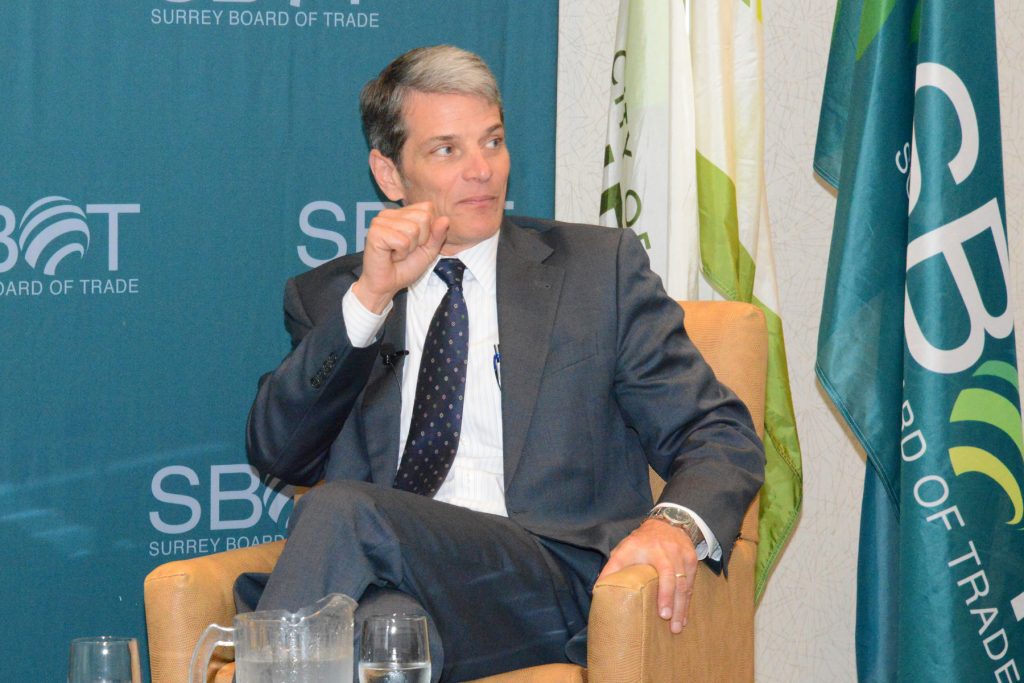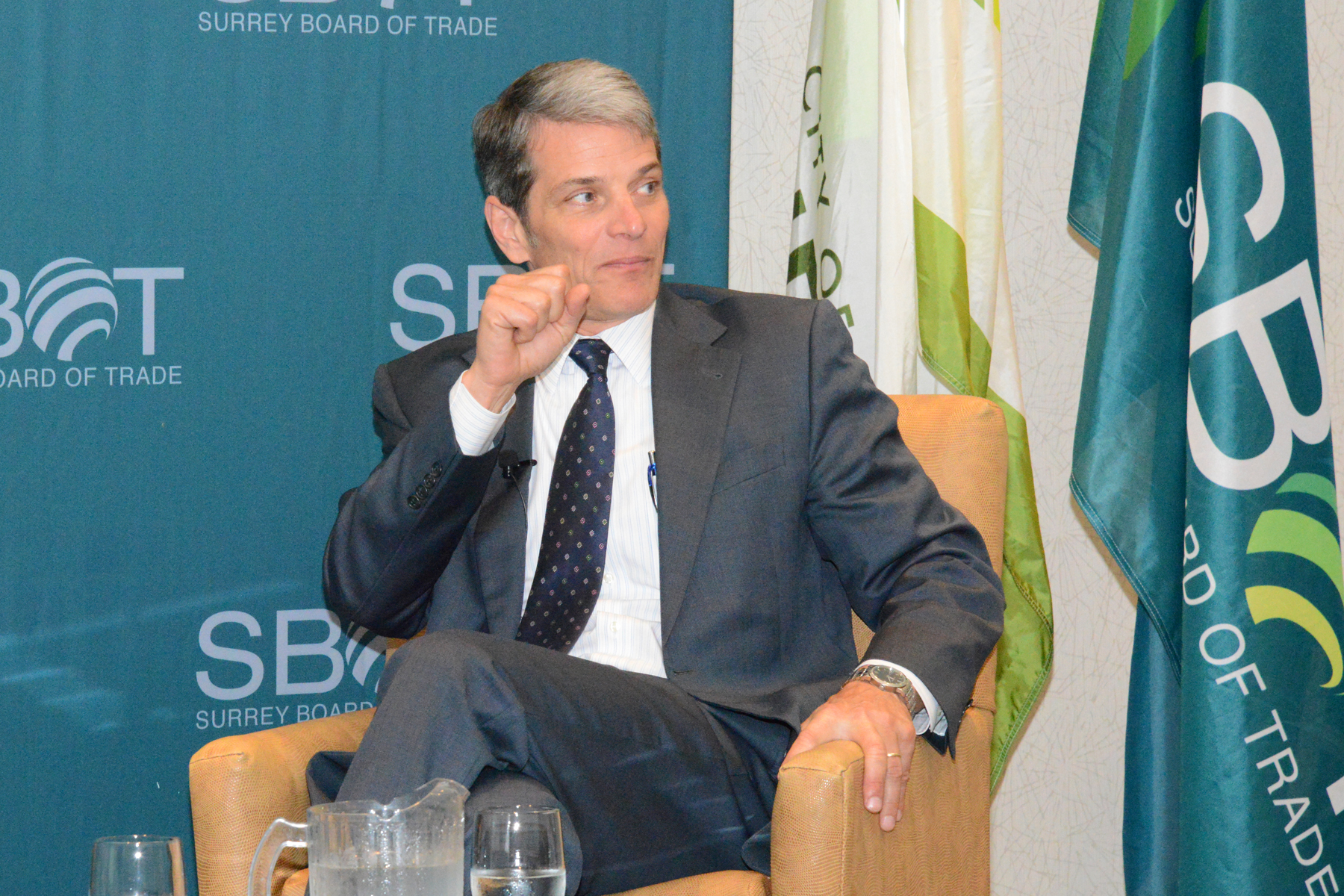By Ray Hudson
New CEO Kevin Desmond at the Surrey Board of Trade

Kevin Desmond, the CEO of TransLink spoke with members of the Surrey Board of Trade (SBOT) recently as part of his intention to be open and informative with the public and tell them what’s going on about its Transit service. It’s one of his key priorities, to get out of the office and communicate with the customers. This week, we continue the conversation between Desmond, and new SBOT Chair, Dr. Greg Thomas.
In the last few years there have been some major breakdowns in the system, particularly on the older Expo line, issue of security and the perception that the organization is not communicating with the public as well as it could. This has lead to some loss of trust, which Desmond addressed when asked how he would deal with this perception.
We must remind people about the good things that our transit does – Desmond
“I have to do more public meetings like this. I think TransLink has lacked a good spokesperson to talk to the public and remind people about the good things that our transit does. I’ve been coming up here, off and on over the years professionally, to view, study and learn from all of the good things this region has done. This is a really good transit system. The SkyTrain automated system is phenomenal.
Growing up in New York, and even to this day, people are looking down the tunnel wondering when the train is going to come. New York can’t exist without its subway system and yet it’s a mess. It’s over-crowded, it’s rife with delays. We have a system here that being automated can operate at very close headways (frequency between the trains) and it’s incredibly reliable, except when it’s not. SkyTrain works 98% of the time, but when there’s a system problem it takes longer to reset than a human powered system. Two summers ago we had the shut-downs, and one of the self-inflicted wounds I think, that TransLink had, was in not doing a very good job of informing the people what to do. They didn’t handle the customer well. TransLink is well aware of that, and my board has made a point that it wants me to be more focused on the customer. I have been customer focused my whole career, to deliver what the customer needs. The customer wants convenient and reliable transit service. We need some funding to put some more capacity in the system, but where we can bring more reliability we will, and a major part of that is telling people what’s going on. Frankly the issue of the salary of the CEO was utterly irrelevant when it comes to the billions of dollars needed for the development of the system.
The Compass Card Fare Gate system.
When I got to Pierce County Transit in 1996, the very first thing I had to do was implement the regional fare coordination system, which became the ORCA program. It took thirteen years to get it working properly, and there were reasons for that. Every system is different. In New York City, I was part of the startup of the MetroCard system, which was many years in the making. I don’t know of any complicated automated fare collection system that is implemented quickly or easily. Incidentally when MetroCard was implemented, they got a lot of criticism because New York rolled it out at 78 of the almost 300 subway stations. If you fast-forward, MetroCard is now an icon in New York City.
It took us a while to get the ORCA Card implemented but by 2009 Metro was doing customer service reports just like TransLink. The number one attribute named at County, was the Orca Card. When I left Metro in March, about 70% of our transactions are on Orca Card. The Compass Card was implemented last summer, and the fare gates closed on April 4. Shortly after the fare gate closure, 94% of all transactions on all of our systems, SkyTrain, Bus, SeaBus and West Coast Express, were by Compass Card. The take off is extraordinary and the initial customer satisfaction surveys on Compass are really like those on the Orca System. Compass Card works just fine.
Fare gates and people with disabilities
This transit system is one of the most accessible transit systems in the world, as a starting point. So it’s pretty easy for people with disabilities to use the SkyTrain system. This isn’t necessarily common for heavy rail transit systems. The issue that TransLink did not handle as well as it could have, involved folks who are primarily quadriplegic, those people with little or no use of their arms to be able to tap their cards. It’s a very small number of people, but we need to honour their needs. They want their independent access to the system, and we’re dealing with how to satisfy that problem. Frankly, the fact that people with that level of disability can independently negotiate the system is astonishing. So it’s very important to me that we find a solution. I think we have a technology solution that we’ll put in place over the next year and a half. In the meantime, we’re still working with advocates on the solution.
Desmond said that there are paybacks that go beyond improving fare collection. “We’re seeing some positive elements of security within the rail system, and finally I think it’s a great path for launching other innovations to leverage the power of this electronic fare system to do other interesting and innovative things. We’ve already got sixteen thousand people who have logged onto our website to provide feedback, so I’m very excited about this level of engagement at this point to develop policies that will help us develop other things out of the Compass system.
Stay tuned!












